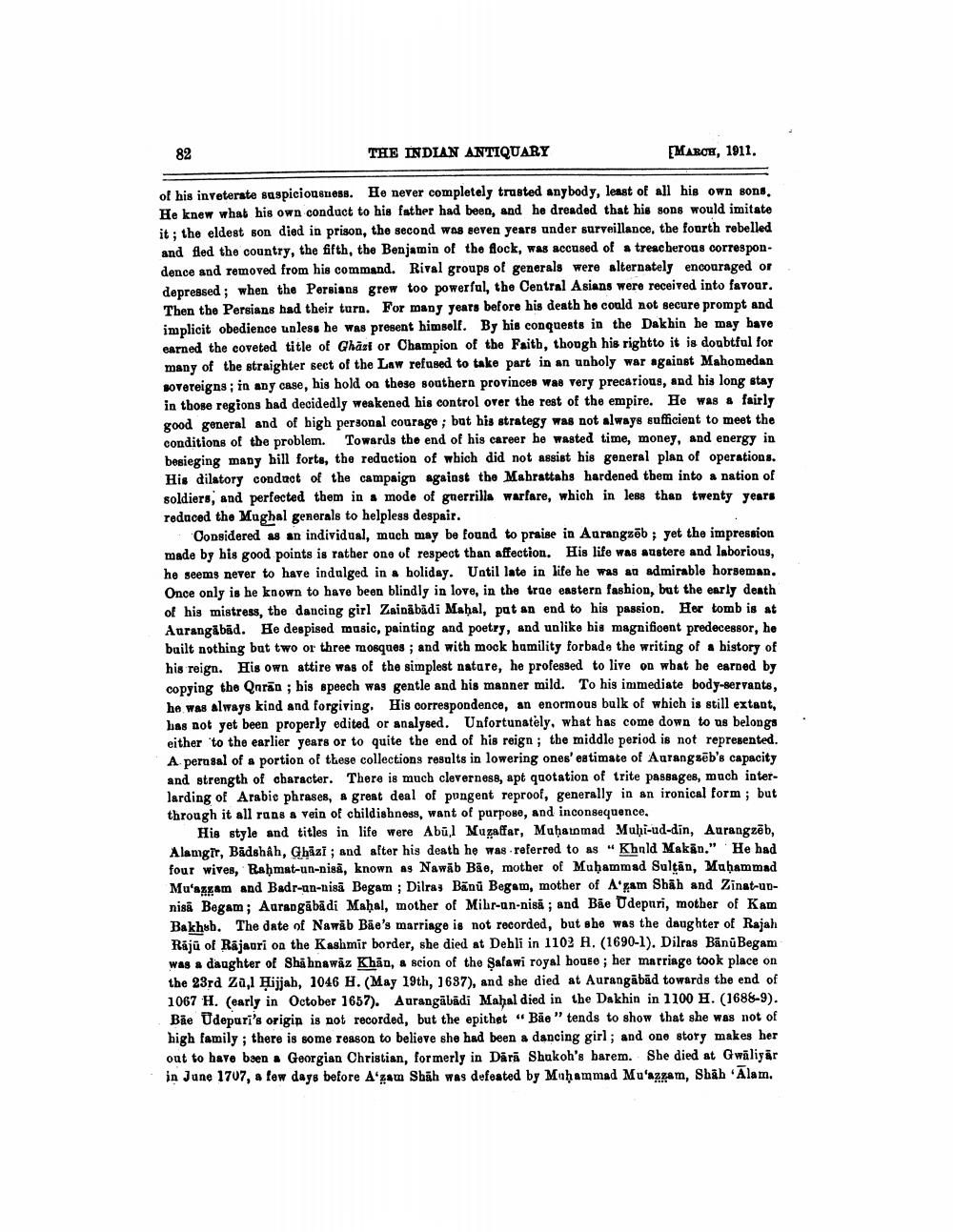________________
82
THE INDIAN ANTIQUARY
[MARCH, 1911.
of his inveterate suspiciousness. He never completely trusted anybody, least of all his own sons. He knew what his own conduct to his father had been, and he dreaded that his sons would imitate it; the eldest son died in prison, the second was seven years under surveillance, the fourth rebelled and fled the country, the fifth, the Benjamin of the flock, was accused of a treacherous correspondence and removed from his command. Rival groups of generals were alternately encouraged or depressed ; when the Persians grew too powerful, the Central Asians were received into favour. Then the Persians had their turn. For many years before his death he could not secure prompt and implicit obedience unless he was present himself. By his conquests in the Dakhin he may have earned the coveted title of Ghazi or Champion of the Faith, though his rightto it is doubtful for many of the straighter sect of the Law refused to take part in an unboly war against Mahomedan Bovereigns; in any case, his hold on these southern provinces was very precarious, and his long stay in those regions had decidedly weakened his control over the rest of the empire. He was a fairly good general and of high personal courage ; but his strategy was not always sufficient to meet the conditions of the problem. Towards the end of his career he wasted time, money, and energy in besieging many bill forts, the reduction of wbich did not assist his general plan of operations. His dilatory conduct of the campaign against the Mahrattahs hardened them into a nation of soldiers, and perfected them in a mode of guerrilla warfare, which in less than twenty years reduced the Mughal generals to helpless despair.
Considered as an individual, much may be found to praise in Aurangzēb; yet the impression made by his good points is rather one of respect than affection. His life was austere and laborious, he seems never to have indulged in a holiday. Until late in life he was an admirable horseman. Once only is he known to have been blindly in love, in the trae eastern fashion, but the early death of his mistress, the dancing girl Zainābādi Mahal, pat an end to his passion. Her tomb is at Aurangabad. He despised music, painting and poetry, and unlike his magnifient predecessor, he bailt nothing but two or three mosques; and with mock hamility forbade the writing of a history of his reign. His own attire was of the simplest natare, he professed to live on what he earned by copying the Quran ; his speech was gentle and his manner mild. To his immediate body-servants, he was always kind and forgiving. His correspondence, an enormous bulk of which is still extant, bas not yet been properly edited or analysed. Unfortunately, what has come down to us belongs either to the earlier years or to quite the end of his reign; the middle period is not represented. A perasal of a portion of these collections results in lowering ones' estimate of Agrangsēb's capacity and strength of character. There is much cleverness, apt quotation of trite passages, much interlarding of Arabic phrases, a great deal of pungent reproof, generally in an ironical form ; but through it all rano a vein of childishness, want of purpose, and inconsequence,
His style and titles in life were Abül Muzaffar, Muhammad Muhi-ud-din, Aurangzēb, Alamgir, Bādshậh, Ghizi ; and after his death he was referred to as "Khnld Makan." He had four wives, Rahmat-un-nisā, known as Nawāb Bãe, mother of Muhammad Sultan, Muhammad Mu'azzam and Badr-an-nisa Begam ; Dilras Bānu Begam, mother of A'zam Shāh and Zinat-unnisa Begam; Aurangabadi Mahal, mother of Mihr-an-nisa; and Bãe Udepuri, mother of Kam Bakhsh. The date of Nawab Bãe's marriage is not recorded, but she was the daughter of Rajah Rajů of Rajaori on the Kashmir border, she died at Dehli in 1102 A. (1690-1). Dilras BānūBegam was a daughter of Shahnawaz Khan, & scion of the Safawi royal house ; her marriage took place on the 23rd Zal Hijjah, 1046 H. (May 19th, 1637), and she died at Aurangabad towards the end of 1067 H. (early in October 1657). Aurangabādi Mahal died in the Dakhin in 1100 H. (1688-9). Bãe Udepuri's origin is not recorded, but the epithet Bão" tends to show that she was not of high family; there is some reason to believe she had been a dancing girl; and one story makes her out to have baen Georgian Christian, formerly in Dära Shukoh's barem. She died at Gwäliyar in June 1707, a few days before Azam Shah was defeated by Muhammad Mu'magam, Shah Alam.




